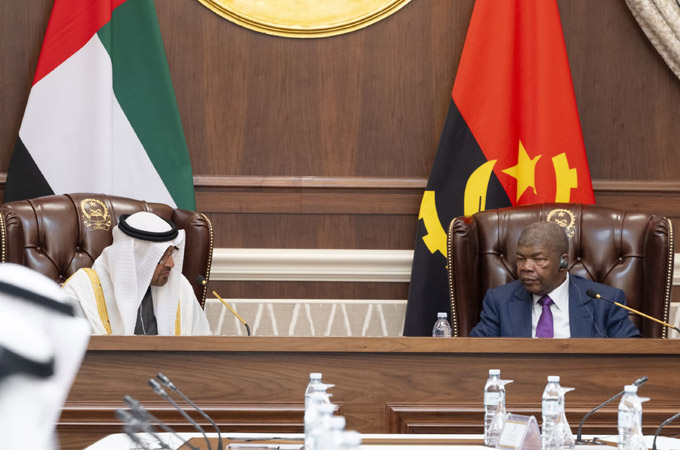
The Comprehensive Economic Partnership Agreement (CEPA) between the UAE and Angola will increase non-oil bilateral trade to more than $10 billion annually by 2033, add about $1 billion to the GDP of both countries, creating nearly 30,000 new jobs, said Dr Thani Al Zeyoudi, UAE Minister of Foreign Trade.
UAE President His Highness Sheikh Mohamed bin Zayed Al Nahyan and João Manuel Lourenço, President of the Republic of Angola, on Monday witnessed signing of the CEPA as part of HH Sheikh Mohamed's state visit to Angola.
The agreement will also expand the UAE’s ties with Sub-Saharan and West African markets — a high-growth region seeking to accelerate its development journey through strategic investments and partnerships.
It will also reinforce the UAE’s role as a global supply chain hub and a key link between the Arab world, Europe, Asia, and Africa, the minister said in a statement to the Emirates News Agency (WAM).
Dr Al Zeyoudi noted that Angola is one of the most promising countries in the region thanks to its young population, abundant natural resources, and GDP growth of 4.4% in 2024. He pointed out that this agreement builds on the current momentum in bilateral trade, particularly in sectors such as gemstones, minerals, mining, digital trade, and agri-tech.
He explained that Angola’s strategic geographical location on the Atlantic coast of Southern Africa gives it the potential to become a pivotal logistics hub.
Regarding current trade and investment ties, Dr Al Zeyoudi said relations between the UAE and Angola, established in 1997, have witnessed significant progress. Non-oil bilateral trade reached $2.17 billion in 2024, marking 2.6% growth compared to 2023. UAE non-oil exports to Angola stood at $135.6 million, while bilateral non-oil trade during the first half of 2025 amounted to approximately $1.4 billion — a 29.7% increase over the same period in 2024.
The UAE’s main imports from Angola in 2024 included diamonds, gold, copper bars, rods and alloys (worked and unworked), and grains — together accounting for 99.8% of total imports. Key UAE exports to Angola included light petroleum distillates, iron and steel, taps and valves, metal structures and parts, cigarettes, and perfumes, comprising 50% of the UAE’s total exports to Angola.
Re-exports to Angola in 2024 mainly included large and medium-sized vehicles, diesel trucks, spare parts, and mechanical components, representing 50% of total re-exported goods.
He emphasised that there are substantial opportunities to rapidly expand trade and investment ties in critical sectors such as energy, infrastructure, mining, logistics, tourism, and healthcare. He highlighted notable UAE companies already engaged in Angola. Abu Dhabi Future Energy Company (Masdar) is developing a 150 MW solar power project to provide renewable energy to around 90,000 homes, Dubai Investments is constructing the “Dubai Investments Park – Angola” over an area of 2,000 hectares and AD Ports Group recently began operating a multipurpose terminal at the Port of Luanda.
Dr Al Zeyoudi stressed that the CEPA with Angola is a key pillar in achieving the UAE’s economic goals. Foreign trade is a main driver of growth, with the UAE aiming to increase the value of foreign trade to AED4 trillion ($1.1 trillion) by 2031 and to double exports in the same period.
The Minister added that the agreement is balanced and mutually beneficial. It allows for additional imports from Angola worth up to $993.6 million in products such as glass, fish, fruits, and optical goods, while providing opportunities to increase UAE exports by up to $235 million in products such as machinery, electrical equipment, plastics, rubber, ferrous metals, chemicals, and mineral products.
